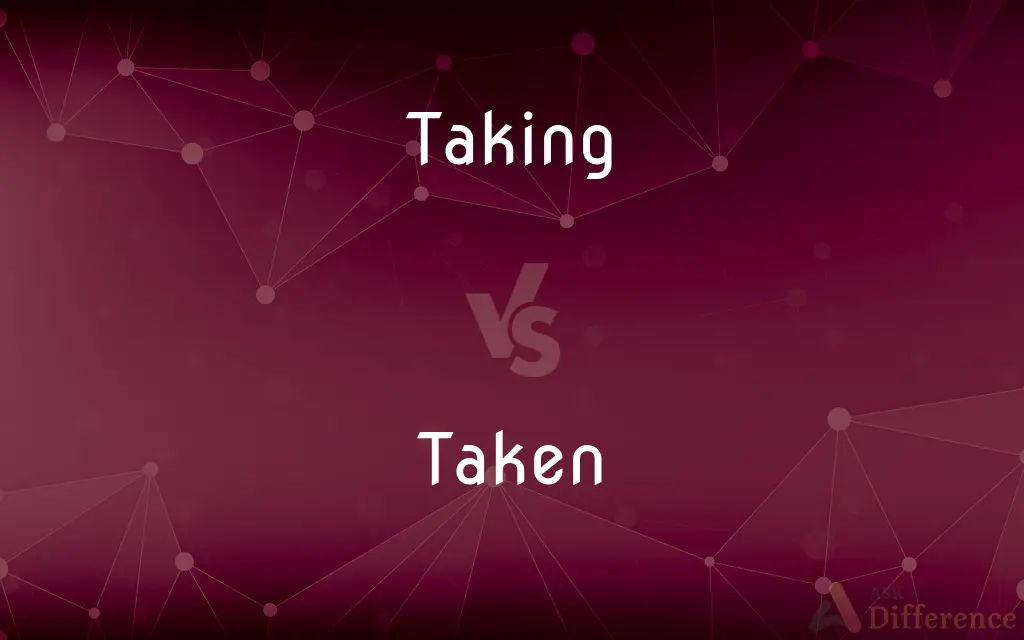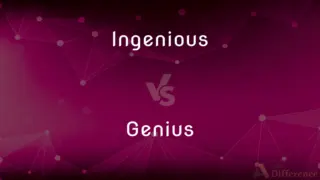Taking vs. Taken — What's the Difference?
Edited by Tayyaba Rehman — By Fiza Rafique — Updated on September 26, 2023
"Taking" is the present participle of the verb "take," while "Taken" is the past participle form of the same verb.

Difference Between Taking and Taken
Table of Contents
ADVERTISEMENT
Key Differences
"Taking" refers to the act of acquiring possession or control over something. In contrast, "Taken" denotes an action that has already been completed, where something has already been acquired or seized. For example, one might say, "She is taking the book from the shelf," highlighting the ongoing action. On the other hand, the statement "The book has been taken by her" emphasizes the completion of the action.
In another context, "Taking" might suggest active engagement in a process. For instance, "She is taking a course in history" implies she's currently enrolled and attending. "Taken," however, would point towards a finished action. In this context, "The course has been taken by many students" indicates the course has previously been selected and completed by various individuals.
The word "Taking" can also describe one's reaction or response, like "He is taking it hard," suggesting a person is currently struggling with a situation. "Taken," in a similar context, might be used in the phrase "He was taken by surprise," expressing a past unexpected event.
Comparison Chart
Grammatical Form
Present participle of "take"
Past participle of "take"
Tense
Indicates ongoing or current action
Indicates completed action or state
ADVERTISEMENT
Example Use
"She is taking the exam."
"The exam has been taken by many."
Associated Terms
Taking a chance, taking a break
Taken aback, taken for granted
Common Phrases
"What are you taking about?"
"The idea was taken into consideration."
Compare with Definitions
Taking
A reaction or response to a situation.
He's not taking the news well.
Taken
Surprised or caught off guard.
He was taken aback by the sudden announcement.
Taking
The act of acquiring or receiving.
She is taking responsibility for the mistake.
Taken
Past form indicating something has been acquired.
The seats are already taken.
Taking
Capturing or recording something.
He's taking a picture of the sunset.
Taken
To be captivated or charmed by something.
She was taken by the beauty of the scenery.
Taking
The action or process of taking something
The taking of life
Taken
Being in a particular state or condition as a result of an action.
He was taken to the hospital after the accident.
Taking
The amount of money earned by a business from the sale of goods or services
The big test for the shop's new look is whether it'll boost takings
Taken
Past participle of take.
Taking
(of a person) captivating in manner; charming
He was not a very taking person, she felt
Taken
Infatuated; fond of or attracted to.
He was very taken with the girl, I hear.
Taking
Capturing interest; fetching
A taking smile.
Taken
(informal) In a serious romantic relationship.
I can't ask him out, she's taken.
Taking
Contagious; catching. Used of an infectious disease.
Taken
Past participle of take
Taking
The act of one that takes.
Taken
Understood in a certain way; made sense of;
A word taken literally
A smile taken as consent
An open door interpreted as an invitation
Taking
Something taken, as a catch of fish.
Taken
Having possession gained especially by force or effort
Taking
(Law) An action by a government, especially under the power of eminent domain, that deprives a private owner of real property or of the use and enjoyment of that property.
Taken
Be affected with an indisposition;
The child was taken ill
Couldn't tell when he would be taken drunk
Taking
Takings(Informal) Receipts, especially of money.
Taken
Accepted or understood as given.
The gesture was taken as a sign of goodwill.
Taking
Alluring; attractive.
Taking
(obsolete) Infectious; contagious.
Taking
The act by which something is taken.
Taking
(uncountable) A seizure of someone's goods or possessions.
Taking
(uncountable) A state of mental distress, resulting in excited or erratic behavior (in the expression in a taking).
Taking
(in the plural) Cash or money received (by a shop or other business, for example).
Fred was concerned because the takings from his sweetshop had fallen again for the third week.
Count the shop's takings.
Taking
Present participle of take
Taking
Apt to take; alluring; attracting.
Subtile in making his temptations most taking.
Taking
Infectious; contageous.
Taking
The act of gaining possession; a seizing; seizure; apprehension.
Taking
Agitation; excitement; distress of mind.
What a taking was he in, when your husband asked who was in the basket!
Taking
Malign influence; infection.
Taking
The act of someone who picks up or takes something;
The pickings were easy
Clothing could be had for the taking
Taking
Very attractive; capturing interest;
A fetching new hairstyle
Something inexpressibly taking in his manner
A winning personality
Taking
Engaging in an action or activity.
She's taking a bath.
Taking
Understanding or interpreting something.
How are you taking this information?
Common Curiosities
Can "Taking" indicate an ongoing action?
Yes, e.g., "She is taking a walk."
How is "Taken" used to express surprise?
As in the phrase "taken aback."
Is "Taken" always passive?
Often, but not always. It's also used in perfect tenses, e.g., "She has taken the test."
What is the basic verb form for both "Taking" and "Taken"?
The base form is "take."
In which tense is "Taken" mainly used?
Past and perfect tenses.
Can "Taking" be used as a noun?
Yes, e.g., "The taking of the castle was swift."
Can "Taking" be about understanding something?
Yes, e.g., "How are you taking the news?"
Is "Taken" used in idiomatic expressions?
Yes, e.g., "taken for granted" or "taken with."
Can "Taking" be about accepting something?
Yes, e.g., "taking an offer."
Share Your Discovery

Previous Comparison
Sike vs. Psych
Next Comparison
Ingenious vs. GeniusAuthor Spotlight
Written by
Fiza RafiqueFiza Rafique is a skilled content writer at AskDifference.com, where she meticulously refines and enhances written pieces. Drawing from her vast editorial expertise, Fiza ensures clarity, accuracy, and precision in every article. Passionate about language, she continually seeks to elevate the quality of content for readers worldwide.
Edited by
Tayyaba RehmanTayyaba Rehman is a distinguished writer, currently serving as a primary contributor to askdifference.com. As a researcher in semantics and etymology, Tayyaba's passion for the complexity of languages and their distinctions has found a perfect home on the platform. Tayyaba delves into the intricacies of language, distinguishing between commonly confused words and phrases, thereby providing clarity for readers worldwide.
















































